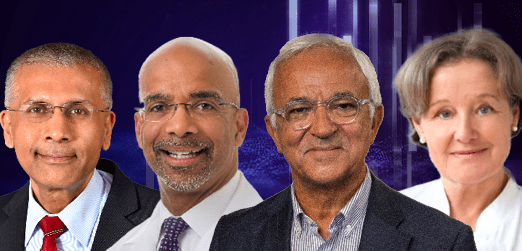- Home
- SGLT-2 Inhibitors - Another Piece of the Puzzle in Heart Failure
SGLT-2 Inhibitors - Another Piece of the Puzzle in Heart Failure
- Heart Failure
Available Credit:
- 1.00
Course Published On:
Course Expiry Date:

Overview
Presented, and recorded, at the ESC in Barcelona, this unique broadcast, ‘SGLT-2 Inhibitors - Another Piece of the Puzzle in Heart Failure’, is centred around the presentation of the latest SGLT-2 inhibition data and how this translates to the treatment of Heart Failure patients.
Radcliffe Medical Education is delighted to introduce the globally renowned faculty. Chaired by Prof Scott Solomon (Boston, US), this session brings together a leading international faculty of Prof John McMurray (Glasgow, UK), Prof Carolyn Lam (Singapore, SG) and Dr Muthiah Vaduganathan (Boston, US) to assess the latest data for SGLT2 inhibitors in heart failure (HF) and how to apply it in real-world practice.
Support Statement
This satellite symposium is supported by an unrestricted educational grant from AstraZeneca who had no involvement in the creation of the content.
Disclosure
In compliance with EBAC guidelines, all speakers/chairpersons participating in this programme have disclosed or indicated potential conflicts of interest which might cause a bias in the presentations. The Organising Committee/Course Director is responsible for ensuring that all potential conflicts of interest relevant to the event are declared to the audience prior to the CME activities.
Terms & Conditions
Radcliffe Education requires contributors to our CME programmes to disclose any relevant financial relationships that have occurred within the past 12 months that could create a conflict of interest. These will be identified in the faculty section if applicable.
The session, ‘SGLT-2 Inhibitors - Another Piece of the Puzzle in Heart Failure’ is accredited by the European Board for Accreditation in Cardiology (EBAC) for 1 hour of external CME credits.
Each participant should claim only those hours of credit that have actually been spent in the educational activity. EBAC works according to the quality standards of the European Accreditation Council for Continuing Medical Education (EACCME), which is an institution of the European Union of Medical Specialists (UEMS).
Through an agreement between the European Board for Accreditation in Cardiology and the American Medical Association, physicians may convert EBAC External CME credits to AMA PRA Category 1 Credits™. Information on the process to convert EBAC credit to AMA credit can be found on the AMA website.
Instructions to Participants
There is no fee for taking part in this online learning activity.
Activities are designed to be completed within 60 minutes and must be completed by the registered user. Physicians should only claim credits for time spent on the activity. To successfully earn credit, participants must complete the activity in full in the indicated time frame.
To complete the course and claim certification participants must:
- Read the course outline information supplied and complete pre-test questions if supplied prior to starting the activity. Users must read and study the activity in its entirety before completing the post-test questions.
- Your results will be automatically saved and if a pass score is achieved (where applicable), you may be eligible to claim credit for the activity and receive a certificate of completion.
Target Audience
- Global Cardiologists
- Heart Failure Specialists
- Primary Care Physicians
- Nurses
- Pharmacists
Learning Objectives
Upon completion of this activity, participants will be able to:
- Recall the results of key trials in HFmrEF in different patients' sub-groups
- Describe how SGLT-2 inhibitors can be used across the range of LVEF
- Apply emerging diagnostic approaches for HFpEF and HFmrEF
- Implement best-practice strategies across the range of LVEF
SGLT2 Inhibitors in HFpEF: Light at the End of the Tunnel
Duration: 15 min
Speakers: Scott Solomon (Brigham and Women's Hospital / Harvard Medical School, Boston, US)
SGLT2 Inhibitors Across the Spectrum of Heart Failure
Duration: 10 min
Practical Considerations For Treating HF With Mildly Reduced and Preserved EF
Duration: 10 min
Speakers: Carolyn Lam (National Heart Centre Singapore Duke-NUS, Singapore, Singapore, SG)
Implementing Best Practices Across the Spectrum of Heart Failure
Duration: 10 min
Discussion
Duration: 15 min
Speakers: Scott Solomon (Brigham and Women's Hospital, Boston, US / Harvard Medical School, Boston, US) John JV McMurray (Institute of Cardiovascular and Medical Sciences, University of Glasgow, Glasgow, UK) Carolyn Lam (National Heart Centre Singapore Duke-NUS, Singapore, Singapore, SG) Muthiah Vaduganathan (Brigham and Women's Hospital Heart and Vascular Center and Harvard Medical School, Boston, Boston, US)
Chair
Panelist













